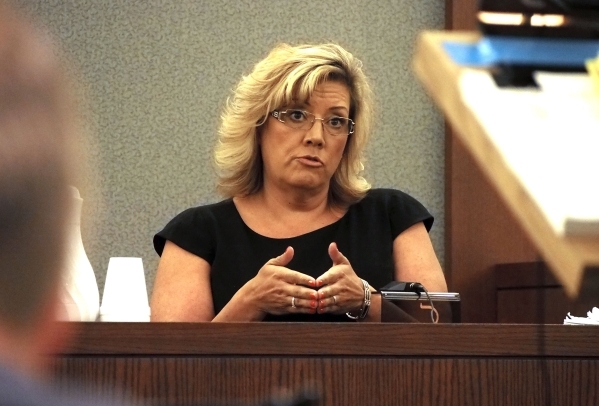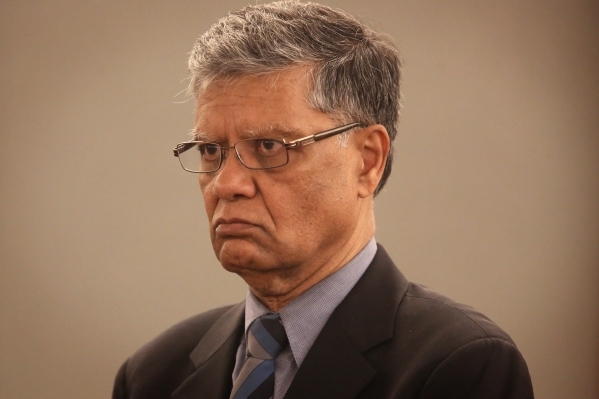Courtroom error cuts $2.2 million restitution to just $50,000
Federal prosecutors wanted a key player in a health care fraud tied to a deadly hepatitis C outbreak to pay $2.2 million in restitution to hundreds of victims, but a judge has ruled their own errors mean a bill of just $50,000.
In a written decision this week, Senior U.S. District Judge Larry Hicks said he was standing by his earlier restitution order of $50,000 for Tonya Rushing because prosecutors failed to object when that amount came up at her May 4 sentencing and then missed the deadline to ask for reconsideration.
But Nevada U.S. Attorney Daniel Bogden Thursday blamed the judge, not his prosecutors in the case, Crane Pomerantz and Mark Kemberling.
He said he was disappointed in Hicks' decision and backed the position of his prosecutors that Rushing's plea agreement called for Rushing to pay substantially more restitution along with her co-defendant, Dr. Dipak Desai, the central figure in the 2007 hepatitis outbreak.
"The plea agreement is clear that $50,000 was intended only as an initial payment to the approximately 600 victims harmed by defendants Desai and Rushing," Bogden said.
Bogden also said it appears from the court record that Hicks agreed to keep the restitution issue open until the government provided a final list of victims, though he acknowledged that Hicks did not rule that way. He would not say if he would appeal the decision or ask Hicks to reconsider.
Rushing, 47, who ran Desai's clinics, and Desai, 65, both pleaded guilty in the scheme that overbilled for anesthesia services between 2005 and 2008. Rushing was sentenced to 366 days in federal prison; Desai was ordered to serve a 71-month term concurrently with a state sentence of life with the possibility of parole after 18 years in relation to hepatitis outbreak.
Desai, who has suffered three strokes since 2007, is serving time under medical watch at the Northern Nevada Correctional Center in Carson City. A jury convicted him in July 2013 of 27 criminal counts related to the hepatitis C outbreak, including second-degree murder in the death of patient Rodolfo Meana, 77.
The state alleged Meana and six other patients were infected with hepatitis C at Desai’s now-closed endoscopy center on Shadow Lane.
Pomerantz and Kemberling argued in court papers that $50,000 in restitution called for in Rushing's plea agreement, which she has already paid, was to be a "good faith expression of her genuine remorse,'' not the "entirety of her obligation."
The prosecutors identified 594 businesses having been over-charged $2.2 million for medical procedures of Desai's patients.
In his three-page decision Wednesday, Hicks rejected the government's arguments.
He said prosecutors knew a pre-sentence report recommended the $50,000 restitution for Rushing.
"At the imposition of the sentence hearing, the court asked the government whether there were any objections to the pre-sentence investigative report, to which the government replied, 'No sir,'" Hicks said. "The court also stated twice that it would impose $50,000 in restitution against Rushing, at no point indicating that the $50,000 was meant merely to be applied to a larger restitution figure."
Hicks said prosecutors, who had 14 days after the May 4 sentencing to ask for a change, didn't get their paperwork in until long after the deadline, on June 2.
Hicks issued his decision without hearing from the defense.
Attorney Robert Draskovich, who was responsible for responding to the government, said prosecutors did not give him notice of their court papers, though co-counsel Louis Schneider said he was informed but didn't recall telling Draskovich.
Without Rushing to share in the $2.2 million restitution it will be more difficult to compensate the defrauded companies.
Desai, a gastroenterologist who gave up his medical license after the outbreak was disclosed in 2008, has gone through a maze of civil, criminal and bankruptcy proceedings, and is said to have lost his wealth.
Bogden, however, expressed hope that another approach will bear fruit.
"Fortunately, the court also entered an $8.1 million order of forfeiture," Bogden said, "and although forfeiture and restitution are separate and distinct, the attorney general of the United States can transfer forfeited assets to victims through a process known as restoration or petition for remission."
Bogden said the Justice Department has returned more than $4 billion in civilly and criminally forfeited funds to crime victims since fiscal year 2002, with $723 million paid to more than 150,000 crime victims in the past three years alone.
Contact Jeff German at jgerman@reviewjournal.com or 702-380-8135. Find him on Twitter: @JGermanRJ.


















